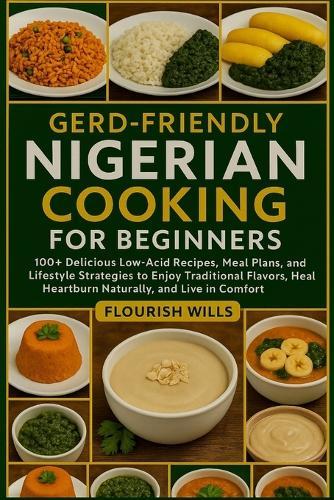Overview
Introduction to GERD and Nigerian Cuisine Understanding GERD and Acid Reflux Gastroesophageal Reflux Disease (GERD) is a digestive condition where stomach acid frequently flows back into the esophagus, the tube connecting the mouth and stomach. This backward flow, often called acid reflux, can cause discomfort and a burning sensation known as heartburn. While almost everyone may experience occasional heartburn, GERD is characterized by chronic or frequent episodes that interfere with daily life. Symptoms can include chest pain, regurgitation of sour liquid, difficulty swallowing, coughing, hoarseness, and even disturbed sleep. For Nigerians, food is more than nourishment-it is a way of life, culture, and expression. Meals are often vibrant, flavorful, and communal, but the very spices, cooking oils, and methods that define Nigerian cuisine can sometimes aggravate acid reflux. Understanding GERD, therefore, is the first step to modifying Nigerian meals without losing their cultural essence. Triggers of GERD in Everyday Foods While GERD symptoms can vary from person to person, certain foods and habits are commonly linked to flare-ups. Nigerian diets, rich in peppers, oils, and starches, can present unique challenges for those managing reflux. Recognizing these triggers is essential: Spicy Peppers: Scotch bonnet, chili, and ata rodo give Nigerian food its bold heat but can irritate the esophagus. Oily Foods: Fried plantains, puff-puff, and greasy stews can delay digestion and worsen reflux. Acidic Ingredients: Tomatoes, citrus fruits, and vinegar often form the base of Nigerian stews and sauces, but they increase stomach acidity. Large Portions: Nigerian communal meals encourage generous servings, which can put pressure on the stomach and encourage acid flow. Late Night Eating: It is common to enjoy heavy dinners late in the evening, a habit that aggravates reflux since lying down soon after eating makes symptoms worse. Not all Nigerians with GERD will react to every trigger, but awareness allows for modification rather than complete avoidance. How Nigerian Food Culture Fits In Nigerian cuisine is celebrated for its diversity, drawing from hundreds of ethnic groups, each with unique recipes and culinary traditions. From jollof rice shared at weddings to pepper soup served as comfort food, meals are tied to memory, identity, and family. For someone with GERD, the fear of losing connection to such traditions can feel overwhelming. The good news is that with careful adjustments, Nigerian meals can remain both flavorful and reflux-friendly. Consider these cultural connections and how they may be modified for comfort: Rice Dishes: Jollof rice and fried rice can be prepared with fewer tomatoes and mild spices, preserving their festive role without irritating the stomach. Soups and Stews: Egusi, okra, and vegetable soups can be cooked with reduced oil and no pepper overload, while still keeping their authentic taste. Swallow Staples: Fufu, eba, amala, and semo are not inherently reflux-inducing, but pairing them with milder soups can make them safe and soothing. Snacks and Street Foods: Suya, puff-puff, and roasted plantains can be adapted-grilled meats with less spice, baked snacks instead of deep-fried, and ripe plantains cooked gently without heavy oil. The Challenge and Opportunity Living with GERD in a Nigerian context is not about giving up beloved dishes; it is about creating a balance between health and heritage. By learning the science of reflux triggers and applying it to traditional cooking methods, one can enjoy meals without fear of discomfort. The key lies in substitution, moderation, and preparation techniques. Instead of feeling deprived, think of this journey as an opportunity to rediscover Nigerian cuisine through a fresh, health-centered lens.
Full Product Details
Author: Flourish Wills
Publisher: Independently Published
Imprint: Independently Published
Dimensions:
Width: 15.20cm
, Height: 1.20cm
, Length: 22.90cm
Weight: 0.304kg
ISBN: 9798269150161
Pages: 222
Publication Date: 10 October 2025
Audience:
General/trade
,
General
Format: Paperback
Publisher's Status: Active
Availability: Available To Order

We have confirmation that this item is in stock with the supplier. It will be ordered in for you and dispatched immediately.



